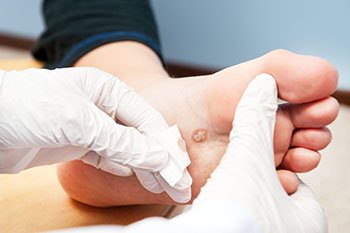
 Plantar warts are a small growth on the sole of the foot. They grow because of the human papillomavirus (HPV) that infects the foot through small cracks in the skin. These growths usually form in weight bearing areas, and they usually appear flat. Plantar warts can often look grainy and somewhat rough, and can also be indicated by black dots that are often small clots, pain or tenderness while standing or walking, and thickened hard skin over the wart. If you have a plantar wart, please consult with a podiatrist. A podiatrist will be able to suggest treatments such as cryotherapy, laser treatment, prescriptions or surgery
Plantar warts are a small growth on the sole of the foot. They grow because of the human papillomavirus (HPV) that infects the foot through small cracks in the skin. These growths usually form in weight bearing areas, and they usually appear flat. Plantar warts can often look grainy and somewhat rough, and can also be indicated by black dots that are often small clots, pain or tenderness while standing or walking, and thickened hard skin over the wart. If you have a plantar wart, please consult with a podiatrist. A podiatrist will be able to suggest treatments such as cryotherapy, laser treatment, prescriptions or surgery
Plantar warts can be very uncomfortable. If you need your feet checked, contact Dr. Thomas Tran from Southwestern Foot & Ankle Associates, P.C.. Our doctor will assist you with all of your foot and ankle needs.
About Plantar Warts
Plantar warts are the result of HPV, or human papillomavirus, getting into open wounds on the feet. They are mostly found on the heels or balls of the feet.
While plantar warts are generally harmless, those experiencing excessive pain or those suffering from diabetes or a compromised immune system require immediate medical care. Plantar warts are easily diagnosed, usually through scraping off a bit of rough skin or by getting a biopsy.
Symptoms
Treatment
To help prevent developing plantar warts, avoid walking barefoot over abrasive surfaces that can cause cuts or wounds for HPV to get into. Avoiding direct contact with other warts, as well as not picking or rubbing existing warts, can help prevent the further spread of plantar warts. However, if you think you have developed plantar warts, speak to your podiatrist. He or she can diagnose the warts on your feet and recommend the appropriate treatment options.
If you have any questions please feel free to contact our office located in Frisco, TX . We offer the newest diagnostic and treatment technologies for all your foot and ankle needs.
Copyright © Southwestern Foot and Ankle Associates, P.C. | Site Map | Nondiscimination | Design by: Podiatry Content Connection